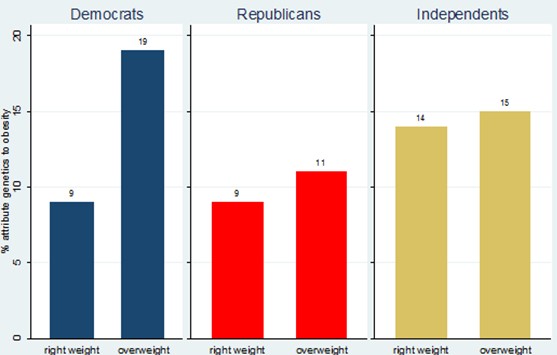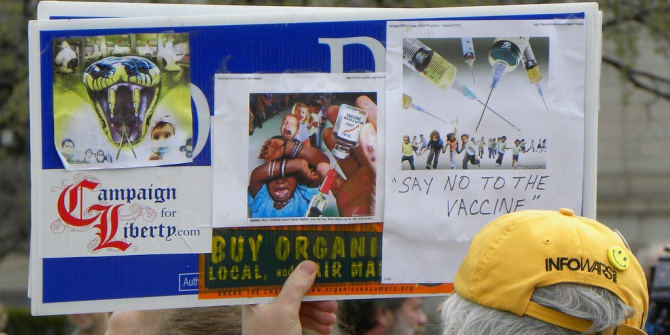
 More than 70 percent of American adults are overweight, with over a third in the obese category, but the public in general does not support a greater role for government in tackling this problem. In new research, Don Haider-Markel and Mark Joslyn look at whether or not Americans think that obesity is caused by biology or a result of individual choice. Although they find that 86 percent believe it is due to lifestyle habits, there is also a political component: 15 percent of Democrats favor genetics as the cause of obesity compared to 10 percent of Republicans. These attributions also have policy implications: those who felt that obesity is down to genetics were more likely to resist discriminatory hiring practices based on weight.
More than 70 percent of American adults are overweight, with over a third in the obese category, but the public in general does not support a greater role for government in tackling this problem. In new research, Don Haider-Markel and Mark Joslyn look at whether or not Americans think that obesity is caused by biology or a result of individual choice. Although they find that 86 percent believe it is due to lifestyle habits, there is also a political component: 15 percent of Democrats favor genetics as the cause of obesity compared to 10 percent of Republicans. These attributions also have policy implications: those who felt that obesity is down to genetics were more likely to resist discriminatory hiring practices based on weight.
Based on some reports and government data we may be in the midst of a public health crisis, but not everyone sees the same problem nor do all agree about the causes. In 2015, the Center for Disease Control reported nearly 71 percent of United States adults were overweight, more than one third obese, and 17 percent of youth were obese. The health challenges posed by obesity for individuals and governments could be considerable. However, the public does not appear to support a significant government role in curbing the obesity trend and the public disagrees about the causes of obesity.
Causal attributions about obesity are likely an important factor in resistance to government intervention. Research across a variety of behaviors shows that causes perceived as being outside the control of individuals elicit sympathy. In these circumstances, there is support for government intervention. If on the other hand, people identify the causes of behavior as individual choice and habit – and therefore controllable – then responsibility stays with individuals and a limited government role justified.
Do Americans think being overweight is based on the uncontrollable dictates of biology? In a national survey we asked American adults why some people were significantly overweight or obese. When given the option between genetic factors a person is born with or eating and lifestyle habits, most people believe that eating and lifestyle habits are responsible – 86 percent, while only 14 percent select biology as the cause.
But there is also a political component to our attributions. Democrats tend to attribute conditions and behavior to environmental or contextual factors – uncontrollable – and Republicans to often default to individual characteristics and choices are controlled by the individual. For example, Republicans typically attribute poverty to poor choices and lack of effort. Democrats point to the economy and lack of opportunity. Obesity invokes similar partisan differences. Democrats favor genetics as the cause of obesity (15 percent) compared to 10 percent of Republicans. Independents appear to agree with Democrats – 16 percent favor genetics as cause.
Attributions can also have a self-serving component. For positive conditions, such as being smart, intelligent individuals will attribute the conditions to their own choices and hard work. For negative conditions, such as personally being unemployed, individuals are more likely to blame the economy or some other contextual condition. With this in mind we asked survey respondents to assess their own weight; it turns out that people are fairly honest about whether they are overweight. We anticipated overweight people would prefer the genetic attribution. Genetics is of course uncontrollable, which removes self-blame, as well as public blame, for weight issues. People that judged their own weight as about right, however, should be more likely to identify individual choices as causes. In both instances, attributions appear motivated by weight and in that respect self-serving. This is the case. Over 15 percent of overweight people attributed weight to genetics and only 10 percent of the about right weight people did so.
Overweight respondents are more likely to favor genetics, compared to the about right weight respondents, but we were curious whether this was true among Democrats, Republicans and Independents. It would seem that overweight Republicans are cross-pressured–their weight predisposes them toward genetic explanations but eating and lifestyle habits is favored among their party. This is not true for overweight Democrats—weight and party work in the same direction. Democrats and overweight people are both prone to genetic explanations. The likelihood of genetics as cause for obesity should then be especially evident among overweight Democrats.
Figure 1 – The impact of weight by party identification

Figure 1 shows the relationships between party identification, weight and propensity to attribute genetics to obesity. For Republicans and Independents, weight does not appear to matter. Differences between right weight and overweight Independent and Republicans are modest and not statistically meaningful. However, for Democrats weight is an important factor. There is a notable 10 percent difference in attributing genetics to obesity between those who defined themselves as having the right weight and overweight Democrats.
But what does it matter if people make genetic attributions for obesity? We wanted to know whether causal explanations for obesity influenced policy preference, including employment discrimination. We first asked respondents about weight and hiring practices: “Do you think companies should be allowed to refuse to hire people just because they are significantly overweight or not?” About 25 percent agreed that companies could refuse to hire people based on weight. Employing attributions to predict responses to this question, we discovered genetic attributions significantly reduced the probability of agreeing with the company policy. That is, resistance to discriminatory hiring practices based on weight were especially evident among respondents that believe genetics causes obesity. Relative to conventional predictors of discrimination, such as age, gender, education, party identification, and race attributions for obesity emerged as a powerful factor.
For three other policy questions concerning support for government regulations to limit saturated fat in food, tax fatty food, and holding fast-food industry legally responsible for diet-related health problems, attributions were not as significant predictor. It appears that the genetic attribution is only important when the policy explicitly concerns obesity and a refusal to hire. The connection between obesity and government action regarding taxing and limiting certain foods is perhaps not transparent, especially in comparison with weight based hiring practices.
However, self-reported weight was an important predictor. Overweight respondents were less willing to hold fast-food companies legally responsible and less favorable toward government taxes of fatty food and limitations on saturated fats.
Perhaps overweight people do not view government as the appropriate remedy for obesity. This seems plausible given the significant number of overweight people that believe genetics causes obesity. Alternatively, raising the price of foods by increasing taxes and initiating legal actions may appear excessive and disproportionally affect overweight and obese people. The reliable opposition among overweight people to government policies aimed at fatty foods may in fact be simple self-interest. Self-interest is a prime motive for other health and political related attitudes.
Finally, as obesity rates edge still higher, and debate about the cause and consequence of obesity continues, political differences are likely to sharpen. Presently, most government actions concern changing behaviors, such as taxes on sugary drinks, publication of calorie counts, and encouraging fitness. But, biological explanations are increasingly popular for behaviors, most notably the rise of genetic explanations for sexual orientation. If obesity attributions follow a similar growth pattern, we can anticipate strong opposition to weight based hiring policies.
On the other hand, if obesity rates persist despite sustained government efforts to influence individual choices, blame and discrimination may increase. If governments treat obesity the same as conventional diseases which afflict the population and are deserving of intervention and medical treatment, then blame and discrimination may fall.
This article is based on the paper, ‘“Nanny State” Politics: Causal Attributions About Obesity and Support for Regulation’, in American Politics Research.
Featured image: dial by Chris is licensed under CC BY NC SA 2.0
Please read our comments policy before commenting.
Note: This article gives the views of the authors, and not the position of USAPP – American Politics and Policy, nor of the London School of Economics.
Shortened URL for this post: http://bit.ly/2o7oUOY
_________________________________
 Don Haider-Markel – The University of Kansas
Don Haider-Markel – The University of Kansas
Don Haider-Markel is Professor and Chair of political science at the University of Kansas. His research and teaching is focused on the representation of interests in the policy process and the dynamics between public opinion, political behavior, and public policy. He has more than 20 years of experience in survey research, interviews, and in policy studies. He has authored or co-authored more than 55 refereed articles, over a dozen book chapters, and several books in a range of issue areas, including civil rights, race and inequality, religion and the culture wars, criminal justice policy, terrorism and counterterrorism, and environmental policy.
 Mark Joslyn – The University of Kansas
Mark Joslyn – The University of Kansas
Mark Joslyn is Professor and graduate director of political science at the University of Kansas. His research explores how political attitudes are formed and changed, drawing on cognitive and motivational theories of the political mind.





Not so fun fact…correlation between partisan lean in a state and obesity rates is moderately high (0.54), and increasing. Despite higher obesity rates among the two main minorities groups, the primary drive is white obesity rates (0.58 correlation). And it case it wasn’t obvious, the correlation is the more Republican the state, the higher the obesity rate. Additionally, the correlation seems to have increased over the last 15 years, which brings up the question of whether states like NY and CA, which had relatively higher obesity rates 15 years ago, have taken actions that slowed their rise. Conversely, states like LA, WV, IA, and OK have seen their rates climb at fairly steady rates. Very interesting.